Call the Midwife star talks tough on vaccinations for 'evil diseases'
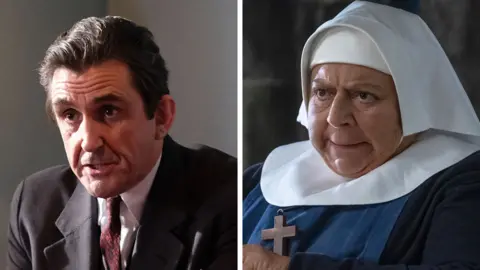 BBC/Neal Street
BBC/Neal StreetCall the Midwife's Stephen McGann is sitting so close to co-star Miriam Margolyes that their kneecaps are touching, as they gather with the cast to talk about the forthcoming series.
But such close physical proximity doesn't appear to faze them all - they call themselves a "family", and McGann graciously offered the comfiest seat to the indomitable Margolyes, joking: "I'll perch here and be your Christmas elf!"
Series nine eases us gently into 1965 with a Christmas special set in Scotland's Outer Hebrides, but as fans of the show will know, its cosy image belies some pretty hard-hitting storylines.
McGann, who plays Doctor Turner and is married to the show's creator and writer Heidi Thomas, is vocal about one of this series' key themes - vaccination.
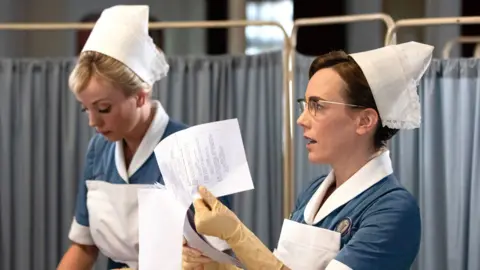 BBC/Neal Street
BBC/Neal Street"Call the Midwife is set at a time when we were setting things such as vaccinations up, when we could still see the evil in front of us," he says.
"But our problem now is we don't see the evil enough."
Citing a recent outbreak of the "filthy disease" diphtheria in Scotland, he adds: "There couldn't be anything more relevant than this period [when the series is set] when we established an industrialised means of protecting ourselves against some absolutely horrible things."
Linda Bassett, who plays nurse Phyllis Crane in the show, agrees. "It's quite strong on vaccination this year because people are stopping doing it, and we're getting outbreaks of measles, which young people don't take seriously, because they didn't go through the time when it killed lots of people."
It's an issue which is regularly in the news.
Falling children's vaccination rates has refuelled debate over whether or not jabs should be compulsory before youngsters are allowed into schools in England, the BBC's health editor Hugh Pym reported earlier this year.
Health secretary Matt Hancock said unvaccinated pupils were "putting other children at risk", adding that he was "looking very seriously" at making vaccinations mandatory.
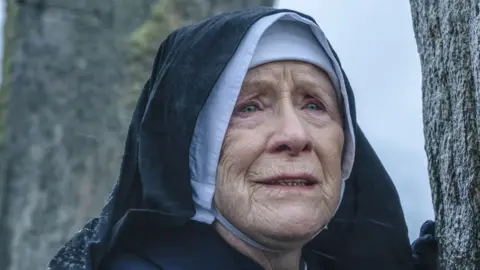 BBC/Neal Street
BBC/Neal StreetBut vaccination is just one of several issues tackled by the show, which has won plaudits for highlighting female genital mutilation, cleft lips and palates and sickle cell disease.
These issues are juxtaposed alongside moments of great warmth, as the midwives and nuns sprinkle their goodness among the residents of Poplar, east London. Its episodes regularly leave viewers feeling teary and emotional.
Allow X content?

Allow X content?

The series is enormously popular - last year it was Christmas Day's most-watched programme with 8.7 million viewers. It's also a Netflix staple, shown in 237 global territories.
The actors have been recognised around the globe, and McGann adds: "There's something called the 200 club in terms of territories, and if you go over it you're sort of ubiquitous around the world."
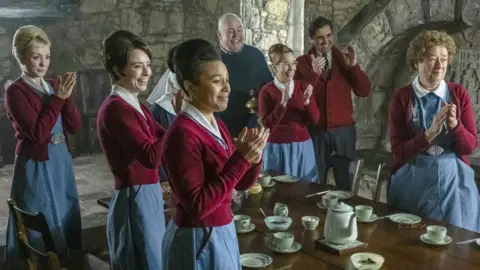 BBC/Neal Street
BBC/Neal StreetCall the Midwife isn't without its critics though.
"I'm not quite sure what Call the Midwife is actually supposed to do for its viewers, but it sure as hell depresses me, " wrote The Independent's Sean O'Grady.
"Just a quick resume of the latest storylines may offer you a hint as to why: a backstreet abortion gone wrong, resulting in an emergency hysterectomy, without patient consent; a newborn baby that almost dies from 'foetal distress'; a generous slice of senile dementia, and one really bad case of piles (or 'pals' as super-posh nurse Trixie Franklin calls this uncomfortable but in fact easily pronounceable condition)."
O'Grady added that the dialogue and characters are "invariably crudely drawn", but the Guardian's Sarah Hughes thought very differently, saying the scripts were "exemplary" and the drama is "subversive... a show filled with believable characters".
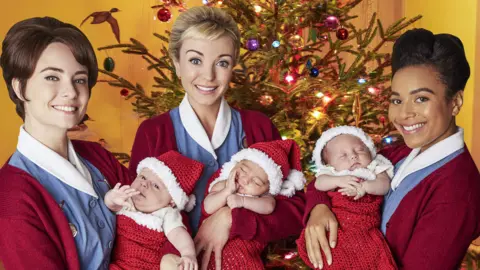 BBC/Neal Street
BBC/Neal Street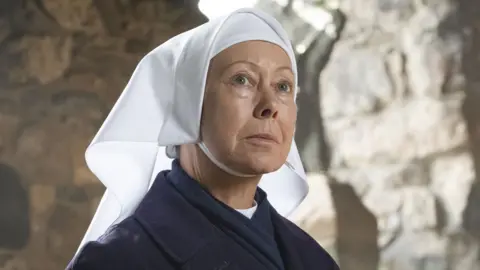 BBC/Neal Street
BBC/Neal StreetJeannette Catsoulis of the New York Times initially found it "a little corny and overly idealised" but was totally won over by "an emotional depth and daring", while The Telegraph's Michael Hogan said it was "a triumph: a series created by, starring and largely about women which has quietly become the BBC's biggest drama".
McGann, a vocal user of Twitter, robustly defends the show, along with along with co-star Jennifer Kirby - and hugely proud of its massive viewing figures.
Allow X content?

Allow X content?

Harry Potter star and Bafta winner Margolyes, who plays Mother Mildred, says: "There is much love for the show, all the classes, all types of people. I think it's an international hit because it's human, the humanity of it reaches everybody."
While she "loves" working on the drama - which of course highlights the strains (often literally) of childbirth - she can't resist joking: "It's just the children who are a nuisance!"
Several cast members mention the response they've had from medics about their depictions of childbirth, for which they have the on-set help of midwife Terri Coates.
Judy Parfitt, [Sister Monica Joan] has been told by doctors the research behind the show is "fantastic", while Jenny Agutter [sister Julienne] adds: "I think that's what Heidi does so well - weaving imagination with reality in her scripts."
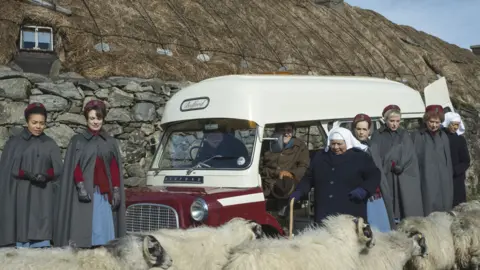 BBC/Neal Street
BBC/Neal StreetParfitt adds: "People love it. I mean with a passion. And it's because it's a gentler way of life. It shows people up in a good light. It's all the things that we desperately all want, and they're not getting at all at the moment."
Although Margolyes teases McGann about "sleeping with the writer", he is full of praise for the show as a whole.
"After nine series, maybe it tells us something about what we hope, what we dream, what we want to be," he says.
"Maybe it's more real than people think it is. It's historical, but it's addressing what people really want - it's about their better instincts, the better ranges of their nature. And I think that's what people respond to."
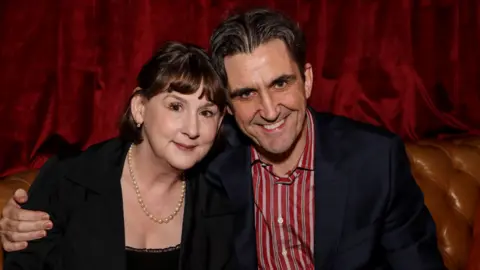 Getty Images
Getty ImagesThomas says for this series she drew upon "a time that is almost too painful to remember" when her mother died in hospital last winter.
"The healthcare system we found ourselves in was underfunded, labyrinthine and creaking at the seams… but at every turn we met with highly skilled, profoundly committed, deeply generous nurses, paramedics and support staff, and they made all the difference."
She describes the show as "a love letter to the NHS" and to "kindness, tolerance and courage, to vocation, community and hope".
The Christmas episode has a recurring theme of uniting people, with a particularly touching storyline shared by Daniel Laurie [Reggie] and Georgie Glen [Miss Higgins], which they describe "a real scene of togetherness".
Allow X content?

Series nine is also shaken up by the arrival of four male trainee doctors, who move into the all-female accommodation at Nonnatus House, which has been an all-female enclave up until now.
"Well, thankfully the older doctors are much more handsome, they picked some very plain young actors," jokes McGann, but Leonie Elliott [Nurse Lucille Anderson] says nurse Crane and Lucille are "not keen to have doctors taking over our bedroom".
And what of the people the show is all about - the midwives?
Jennifer Kirby [Nurse Valerie Dyer] says her respect for them "grows with every episode", while Bassett adds "it's a pride that they like it every year".
Cliff Parisi [Fred Buckle], who has been seen recently in I'm A Celebrity, says when he sat next to a table of 80 midwives at a party: "I have never been so popular! What a fabulous lot they are."
Bassett smiles, saying the midwives' warmth and care are really the core of the show.
"When someone sees your pain and when someone understands you… we all need that all the time, don't we - all the time really."
Call the Midwife is on BBC One on 25 December at 19:30 GMT.

Follow us on Facebook, or on Twitter @BBCNewsEnts. If you have a story suggestion email [email protected].
